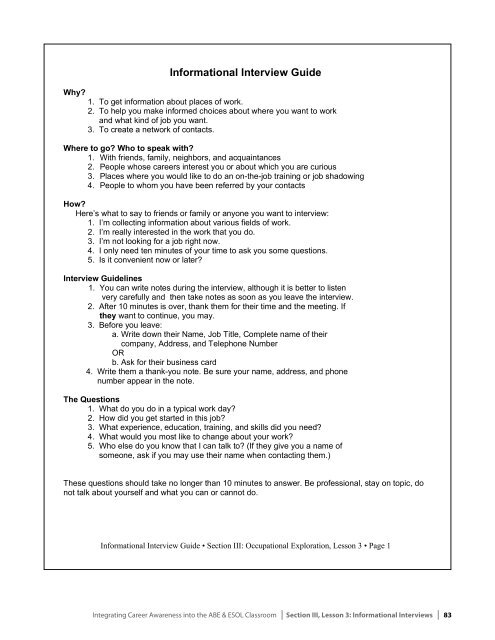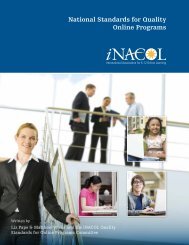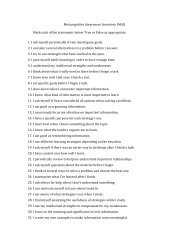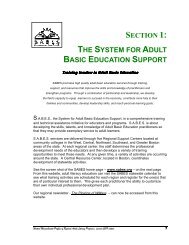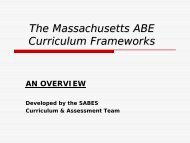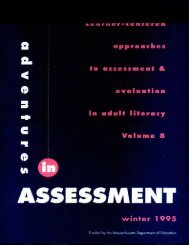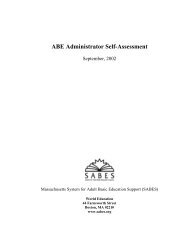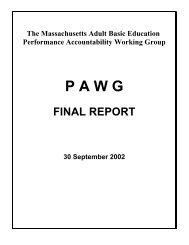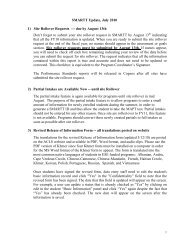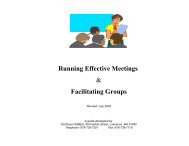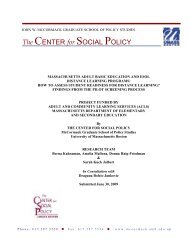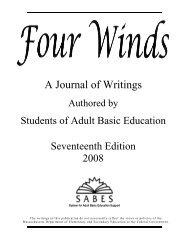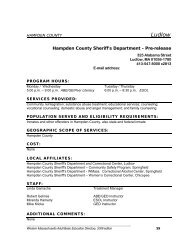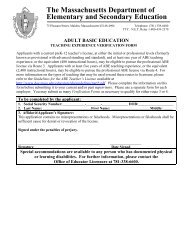Integrating Career Awareness into the ABE/ESOL Classroom - SABES
Integrating Career Awareness into the ABE/ESOL Classroom - SABES
Integrating Career Awareness into the ABE/ESOL Classroom - SABES
- No tags were found...
You also want an ePaper? Increase the reach of your titles
YUMPU automatically turns print PDFs into web optimized ePapers that Google loves.
Why?<br />
Informational Interview Guide<br />
1. To get information about places of work.<br />
2. To help you make informed choices about where you want to work<br />
and what kind of job you want.<br />
3. To create a network of contacts.<br />
Where to go? Who to speak with?<br />
1. With friends, family, neighbors, and acquaintances<br />
2. People whose careers interest you or about which you are curious<br />
3. Places where you would like to do an on-<strong>the</strong>-job training or job shadowing<br />
4. People to whom you have been referred by your contacts<br />
How?<br />
Here’s what to say to friends or family or anyone you want to interview:<br />
1. I’m collecting information about various fields of work.<br />
2. I’m really interested in <strong>the</strong> work that you do.<br />
3. I’m not looking for a job right now.<br />
4. I only need ten minutes of your time to ask you some questions.<br />
5. Is it convenient now or later?<br />
Interview Guidelines<br />
1. You can write notes during <strong>the</strong> interview, although it is better to listen<br />
very carefully and <strong>the</strong>n take notes as soon as you leave <strong>the</strong> interview.<br />
2. After 10 minutes is over, thank <strong>the</strong>m for <strong>the</strong>ir time and <strong>the</strong> meeting. If<br />
<strong>the</strong>y want to continue, you may.<br />
3. Before you leave:<br />
a. Write down <strong>the</strong>ir Name, Job Title, Complete name of <strong>the</strong>ir<br />
company, Address, and Telephone Number<br />
OR<br />
b. Ask for <strong>the</strong>ir business card<br />
4. Write <strong>the</strong>m a thank-you note. Be sure your name, address, and phone<br />
number appear in <strong>the</strong> note.<br />
The Questions<br />
1. What do you do in a typical work day?<br />
2. How did you get started in this job?<br />
3. What experience, education, training, and skills did you need?<br />
4. What would you most like to change about your work?<br />
5. Who else do you know that I can talk to? (If <strong>the</strong>y give you a name of<br />
someone, ask if you may use <strong>the</strong>ir name when contacting <strong>the</strong>m.)<br />
These questions should take no longer than 10 minutes to answer. Be professional, stay on topic, do<br />
not talk about yourself and what you can or cannot do.<br />
Informational Interview Guide • Section III: Occupational Exploration, Lesson 3 • Page 1<br />
<strong>Integrating</strong> <strong>Career</strong> <strong>Awareness</strong> <strong>into</strong> <strong>the</strong> <strong>ABE</strong> & <strong>ESOL</strong> <strong>Classroom</strong> | Section III, Lesson 3: Informational Interviews | 83


